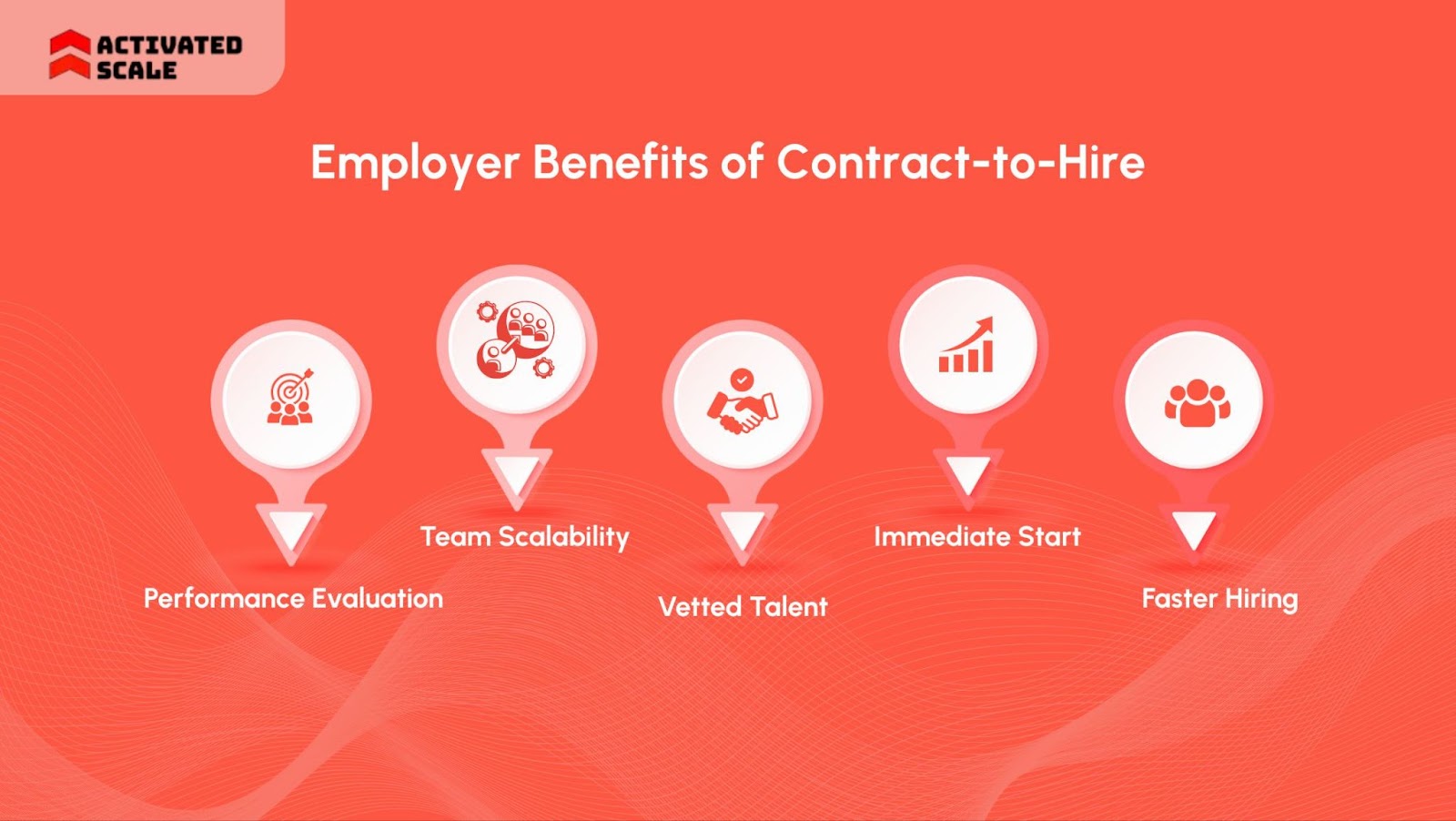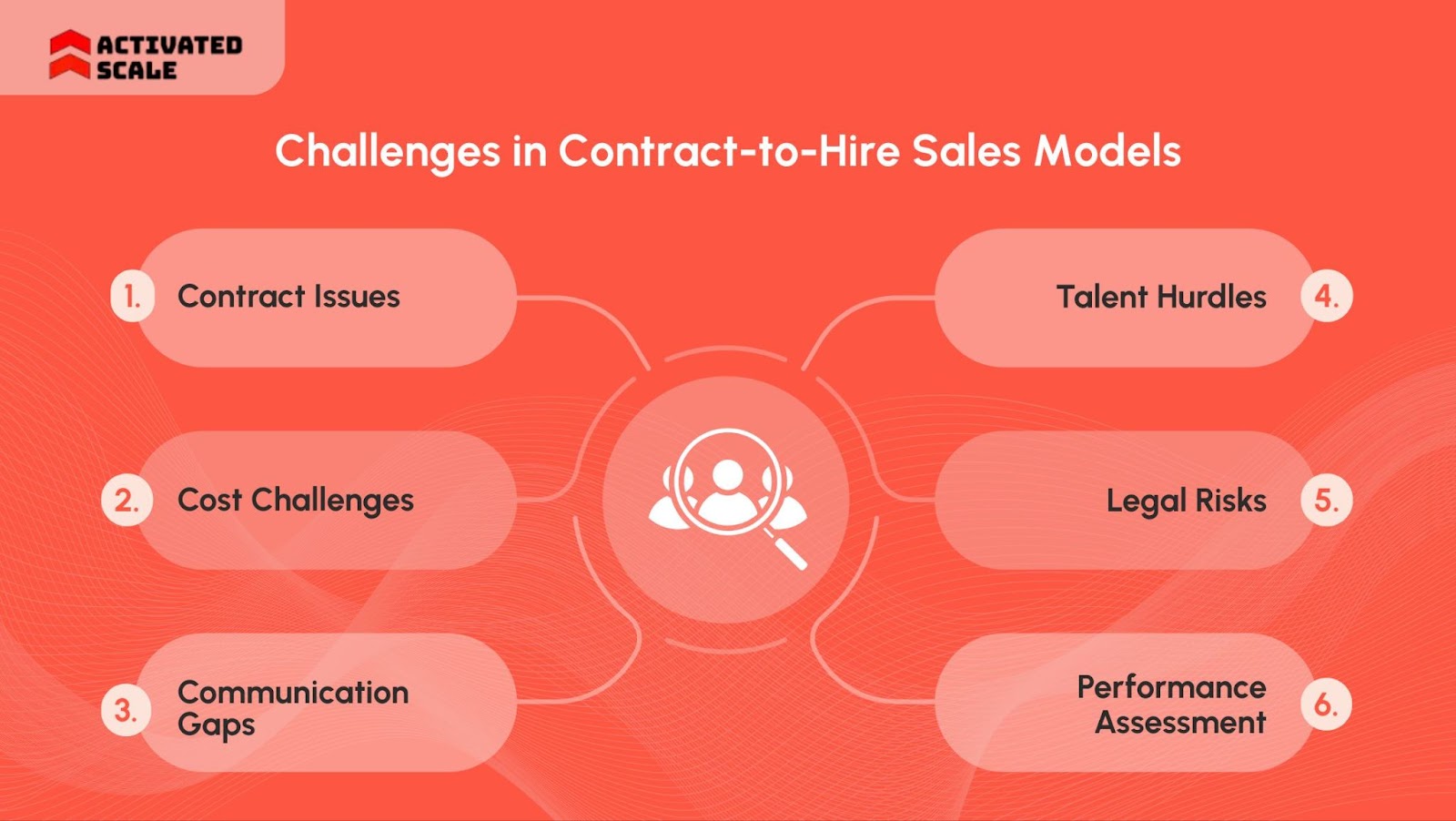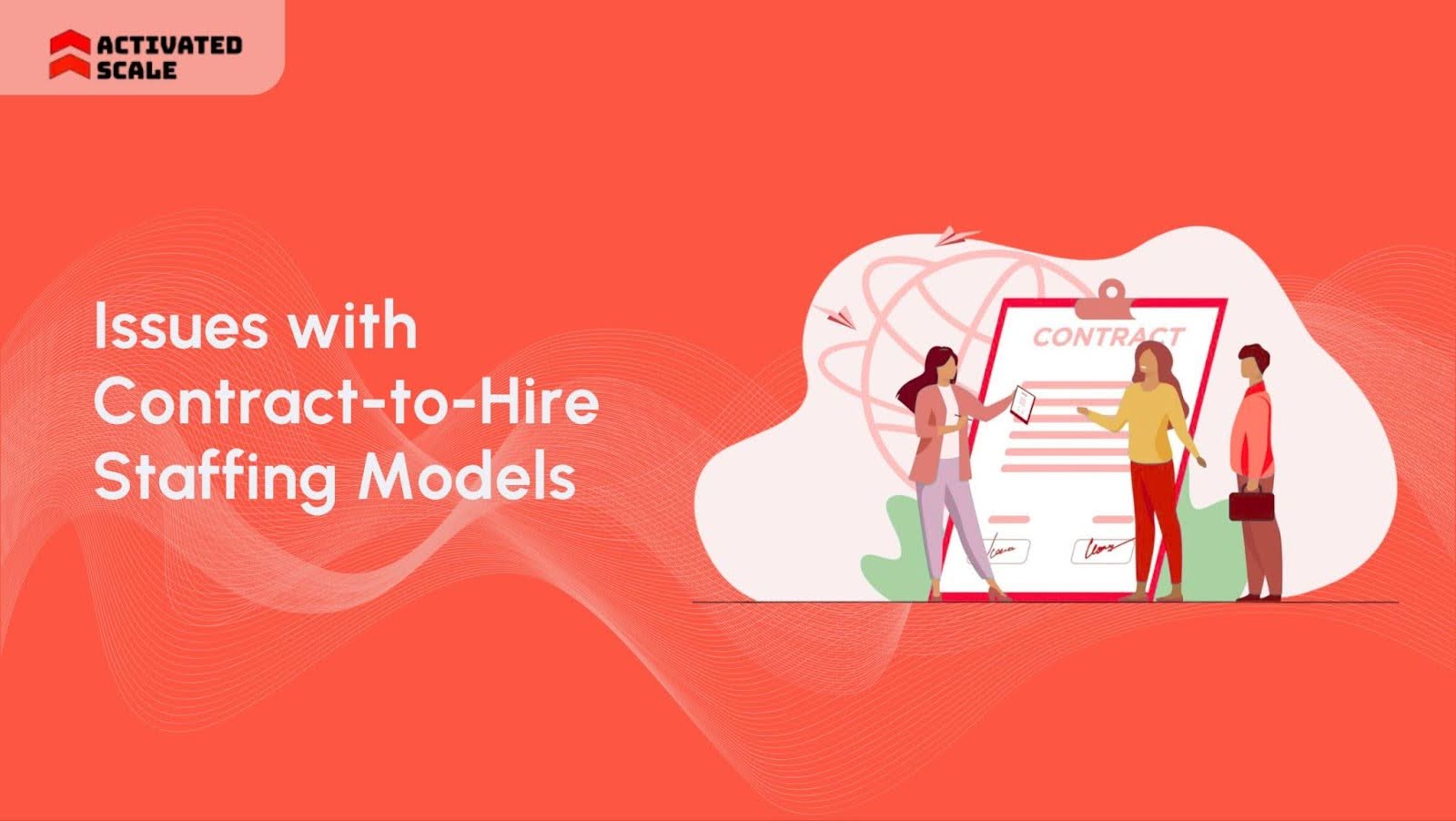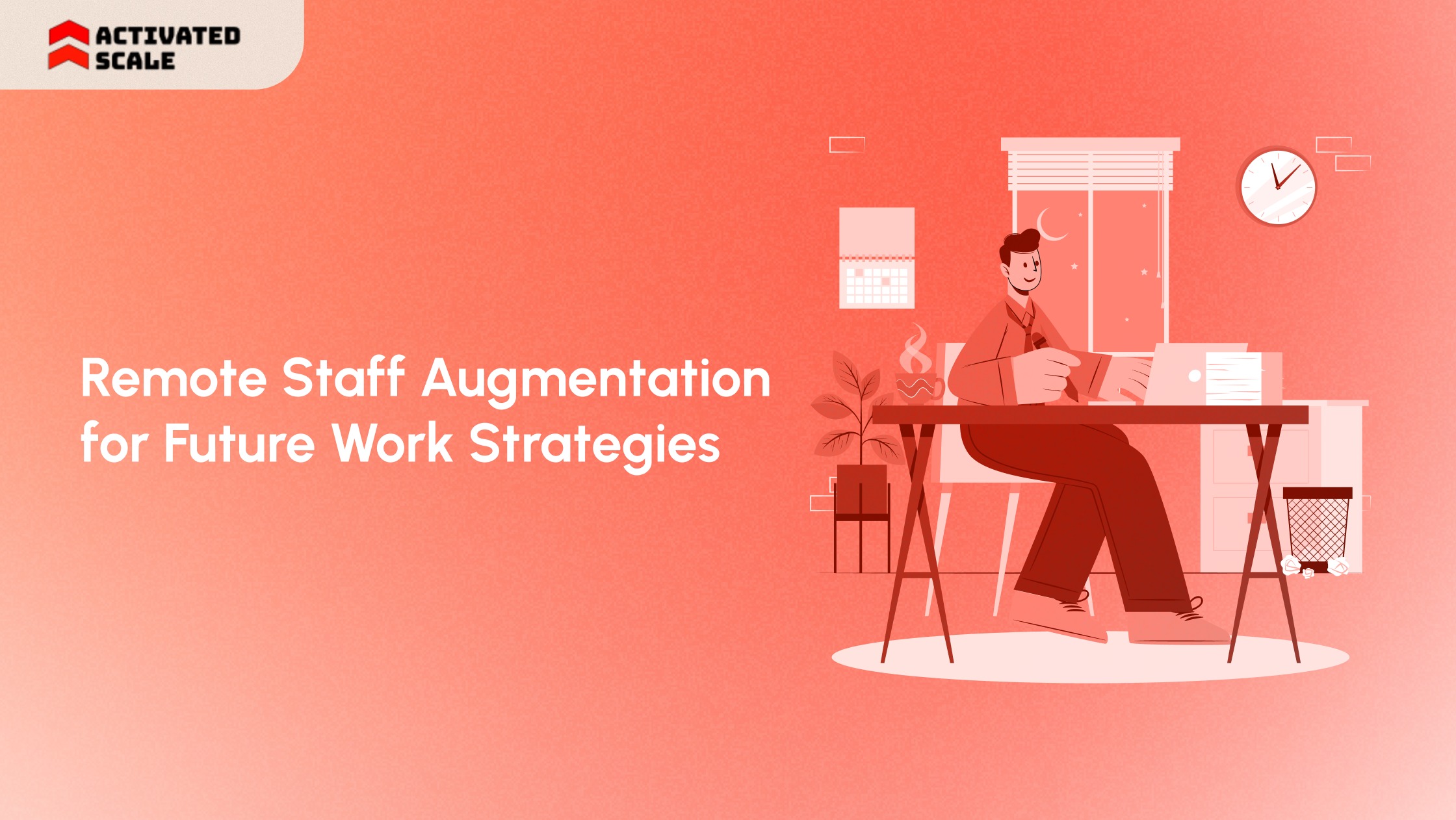The need for flexibility in hiring has become more critical than ever, especially for sales teams. Many businesses are increasingly turning to contract-to-hire staffing models as a solution.
In fact, staffing companies in the U.S. employed nearly 2 million contract workers on a weekly basis in early 2025. This highlights the rise in flexible workforce strategies.
We understand the challenges businesses face when scaling rapidly and needing the right talent without long-term commitments.
That’s why, in this blog, we’ll discuss the challenges in contract-to-hire sales models.
We’ll walk you through the obstacles that can arise for you as an employer. In this way, you can avoid common pitfalls and make informed decisions.
TL;DR
- High-growth teams and startups benefit from the agility to quickly scale teams while managing headcount costs.
- Managing clear expectations and communication is crucial to prevent issues with performance and team integration.
- Contract-to-hire staffing is ideal when you need immediate, skilled contributors but can't add permanent payroll pressures.
- While it offers flexibility, the model comes with challenges, like contract ambiguities and budgeting concerns, that require careful management.
What Do You Need to Know About Contract-to-Hire?
In a contract-to-hire arrangement, a company hires a candidate for a temporary contract, typically lasting between 3 to 12 months. 90% of staffing clients find this effective for evaluating potential full-time employees prior to making permanent hiring decisions.
During this period, the candidate works on the company’s payroll via a staffing agency. This allows the business to evaluate performance and culture fit before making a permanent offer. Key points of contract-to-hire staffing:
- Trial period: Both employer and candidate assess fit before committing to a permanent role.
- Staffing agency involvement: Candidates are on the agency’s payroll during the contract period.
- Evaluation period: Employers assess performance, cultural fit, and adaptability before offering a full-time position.
Startups and high-growth teams often face the challenge of scaling quickly without compromising quality. Contract-to-hire staffing models in the U.S. can offer several advantages to you and your business.
Also Read: The 7 Biggest Hurdles to Hiring Startup Sales Talent & How to Overcome Them
Benefits of Contract-to-Hire for Employers

For employers, the contract-to-hire model offers a way to hire with more confidence, before committing to a full-time position.
This is particularly helpful for roles in sales, where finding the right fit can significantly impact business growth.
Here are the key benefits for employers:0
- Real performance evaluation: Employers can assess how candidates perform in real sales situations before making a full-time offer.
- Flexibility to scale: The model allows companies to scale their teams quickly, especially during periods of growth.
- Access to pre-vetted talent: Staffing agencies provide candidates who are pre-screened, reducing time spent on initial vetting.
- Avoid long notice periods: Employees on contract can start immediately, helping businesses avoid the delays of traditional recruiting cycles.
- Shorter hiring cycle: Compared to full-time recruiting, contract-to-hire roles can be filled faster, enabling quicker team growth.
Activated Scale offers flexible contract-to-hire sales recruiting solutions. With us, you have the confidence to test-fit candidates before making a permanent decision.
However, this model also comes with challenges in contract-to-hire sales models. For example, there may be potential communication gaps or difficulty evaluating candidates fully in a short timeframe.
Common Challenges in Contract-to-Hire Sales Models

While the contract-to-hire model offers flexibility, it comes with several challenges that companies need to be aware of. Understanding these challenges can help organizations manage the risks associated with this staffing model. Common obstacles include:
- Issues with Contract Length and Terms
- Short contracts may not provide enough time to evaluate a candidate’s performance fully. Because here, relationship-building is key.
- Ambiguous contract terms, including unclear conversion clauses, create confusion and frustration for both parties.
- Candidates tend to avoid overly complex contracts or uncertain renewal terms, as these can lead to a lack of commitment.
- Unilateral changes to the employment term contract can lead to turnover or poor morale during the trial period.
- Budgeting and Cost Implications
- Contractors often expect 40% higher pay to compensate for the lack of benefits like healthcare and paid time off. This leads to higher overall costs for employers.
- Budgeting is challenging due to unpredictable contract durations and potential extensions. It makes it difficult for companies to predict staffing expenses.
- The longer a contract lasts without a conversion to full-time, the more likely it becomes a sunk cost for the company.
- Recruitment and agency fees can add up, especially when hiring multiple contractors for key roles, such as sales.
- Communication and Expectation Management
- Ambiguity around the conversion process leads to distrust, with contractors unsure if they will transition to a permanent role.
- Misalignment of expectations, particularly regarding full-time commitment, can result in underperformance or disengagement.
- At least 41% of employees quit due to poor collaboration. This highlights that contractors may struggle to integrate into the company culture fully.
- The pressure to meet sales targets during a trial period can lead to burnout if expectations are not clearly outlined.
- Talent Acquisition Hurdles
- Many top candidates may avoid contract-to-hire roles due to a preference for the benefits offered by full-time positions. That’s why 74% of employers struggle to find the right talent due to this.
- Contractors may hesitate to invest in company systems, processes, or relationships, knowing their role may not convert to full-time.
- High turnover in temporary roles can disrupt the workflow, especially in fast-moving environments like sales.
- Legal and Compliance Issues
- Misclassifying workers as contractors instead of employees can lead to costly penalties. Especially if the worker should be considered full-time under the law.
- Labor laws differ significantly across states and countries. This can create legal risks for businesses hiring contract workers in multiple locations.
- Early termination of a contract without proper cause can result in legal challenges or penalties.
- Issues related to taxes can arise if the contract terms do not align with the legal definitions of contractor vs. employee.
- Lack of proper legal documentation or mismanagement of contract terms can lead to compliance issues.
- Quality and Performance Assessment Difficulties
- Contractors often have limited time to ramp up and learn company processes, which can lead to suboptimal performance or missed targets.
- Employers may unintentionally rely on short-term metrics to evaluate performance. This leads to a bias in the assessment of a candidate’s true potential.
- Sales performance can fluctuate over short periods, so it’s difficult to make a fair judgment based on a limited timeframe.
- Without a training guide for successful remote teams, contractors may not reach their full potential. So, they leave the employer with an incomplete assessment.
Activated Scale can help you handle the complexities of this model, ensuring you find the right talent without the risk. Contact us today to learn how we can organize your hiring process to avoid common pitfalls.
After considering these challenges, are you still confident in using a contract-to-hire model? To help you make an informed decision, we’ve put together a comprehensive checklist.
Also Read: Hiring Fractional Sales Enablement Experts and Consultants
When Should You Use Contract-to-Hire?
Wondering if contract-to-hire is the right option for your business? Answer "Yes" or "No" to each question listed below. If you find yourself saying "Yes" to most, contract-to-hire could be a great fit for your hiring strategy.
Use this checklist to assess your needs:
- Do you need to test-fit candidates before making a long-term commitment?
Yes / No - Are you hiring for high-turnover or performance-critical roles, like sales or engineering?
Yes / No - Is your company in a growth phase with fluctuating headcount needs?
Yes / No - Do you want to reduce time-to-hire while still thoroughly vetting candidates?
Yes / No - Do you need skilled contributors immediately but can’t add full-time payroll pressure?
Yes / No - Are you unsure of long-term funding, but need the role filled today?
Yes / No
How many "Yes" answers did you get?
- 5-6 "Yes" answers: Contract-to-hire could be a solid option for your business.
- 3-4 "Yes" answers: Consider exploring contract-to-hire, but evaluate your specific needs further.
- 0-2 "Yes" answers: A different staffing model might be a better fit for your current situation.
Once you have made your decision to move forward with this hiring model, you are ready to hire. However, it is more difficult than said. That’s why we at Activated Scale offer multiple hiring services for you!
Simplify Your Hiring with Activated Scale's Solutions

Struggling with the challenges in contract-to-hire sales models? Activated Scale’s flexible hiring solutions make it easier to scale your team with confidence. Our services include:
- Contract-to-Hire Sales Recruiting: Hire vetted sales professionals on a flexible, trial basis before committing to full-time employment.
- Fractional Selling: Access experienced SDRs (Sales Development Representatives) and AEs (Account Executives) to fill sales gaps without the need for full-time hires.
- Fractional Sales Leadership: Bring in Fractional VPs of Sales to build go-to-market strategies, partnership programs, and select the right tools.
These services help you handle the challenges in hiring models, offering efficiency in your hiring process.
Read Also: Hire Top Sales Talent for SaaS & Software Success
Conclusion
Contract-to-hire sales models offer a unique blend of flexibility and risk management, making them a great option for startups. However, they come with their own set of challenges that require clear communication and effective management of expectations.
Businesses can avoid costly mistakes and hire with confidence by understanding these obstacles. If you're ready to tackle the challenges in contract-to-hire sales models, then Activated Scale is the right partner for U.S. businesses.
Book a call with Activated Scale today. Let’s discuss how we customize solutions to support your growth.
FAQs
- What is the salary range in contract-to-hire jobs?
Contract-to-hire roles generally offer higher hourly or project-based rates compared to full-time positions. For sales roles, salaries can range from $50,000 to $150,000 annually, depending on experience and the company's location. However, the total compensation can vary depending on industry, job function, and market demand. - How is contract-to-hire different from a regular contract role?
The key difference is that contract-to-hire roles come with the possibility of transitioning into a permanent position after a trial period. This usually lasts for 3-12 months.
Regular contract roles, on the other hand, have a fixed end date. Here, the contractor is typically not considered for full-time employment upon the contract's completion.
- Which is better: contract-to-hire or permanent?
It depends on your needs. If you want to quickly scale your team with flexibility and reduce the risk of a bad hire, contract-to-hire may be ideal. If your company wants a guaranteed commitment, permanent roles may be better suited.
In high-turnover or performance-critical sales roles, contract-to-hire often provides the best balance of flexibility and evaluation.
- Is contract-to-hire good or bad?
Contract-to-hire can be a powerful tool for employers needing to quickly evaluate talent before making a full-time offer. It’s especially beneficial for dynamic companies and startups. However, it can lead to morale and retention challenges if expectations around conversion aren’t clearly communicated or if the contract is seen as unstable. It’s best suited for companies needing flexibility and those who can manage the potential risks of uncertainty.
The Ultimate Guide to Hiring a Salesperson!
Get the step-by-step guide to hiring, onboarding, and ensuring success!
_edi.png)




